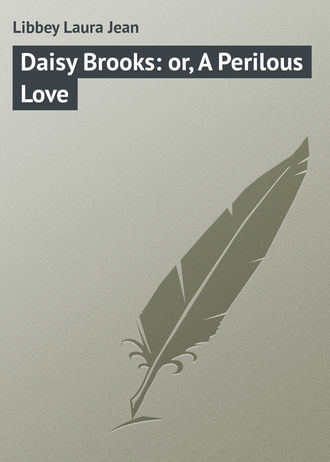 полная версия
полная версияDaisy Brooks: or, A Perilous Love
“You do not believe me, I see,” pursued the woman, calmly. “There is nothing but the stern facts that will satisfy you. You shall have them. They are soon told: Years ago, when I was young and fair as you are now, I lived at the home of a quiet, well-to-do spinster, Taiza Burt. She had a nephew, an honest, well-to-do young fellow, who worshiped me, much to the chagrin of his aunt; and out of pique one day I married him. I did not love the honest-hearted fellow, and I lived with him but a few brief months. I hated him–yes, hated him, for I had seen another–young, gay and handsome–whom I might have won had it not been for the chains which bound me. He was a handsome, debonair college fellow, as rich as he was handsome. This was Basil Hurlhurst, the planter’s only son and heir. Our meeting was romantic. I had driven over to the village in which the college was situated, on an errand for Taiza. Basil met me driving through the park. He was young, reckless and impulsive. He loved me, and the knowledge of his wealth dazzled me. I did not tell him I was a wife, and there commenced my first sin. My extreme youth and ignorance of the world must plead for me–my husband or the world would never know of it. I listened to his pleading, and married him–that is, we went through the ceremony. He had perfect faith in its sincerity. I alone knew the guilty truth. Yet enormous as was my crime, I had but a dim realization of it.
“For one brief week I was dazzled with the wealth and jewels he lavished upon me; but my conscience would not let me rest when I thought of my honest-hearted husband, from whom I had fled and whom I had so cruelly deceived.
“My love for Basil was short lived; I was too reckless to care much for any one. My conscience bade me fly from him. I gathered up what money and jewels I could, and fled. A few months after you were born; and I swear to you, by the proofs I can bring you, beyond all shadow of a doubt, you were my lawful husband’s child, not Basil’s.
“Soon after this event a daring thought came to me. I could present you, ere long, with myself, at Whitestone Hall. Basil Hurlhurst would never know the deception practiced upon him; and you, the child of humble parentage, should enjoy and inherit his vast wealth. My bold plan was successful. We had a stormy interview, and it never occurred to him there could be the least deception–that I was not his lawful wife, or you his child.
“I found Basil had learned to despise even more fiercely than he had ever loved me.
“He took us abroad, refusing to speak or look upon my face, even though he escorted us. In a fit of desperation I threw myself into the sea, but I was rescued by another vessel. A strong inclination seized me to again visit Whitestone Hall and see what disposition he had made of you. Years had passed; you were then a child of five years.
“One terrible stormy night–as bad a night as this one–I made my way to the Hall. It was brilliantly lighted up, just as it is to-night.
“I saw the gate was locked; and through the flashes of lightning I saw a little girl sobbing wildly, flung face downward in the grass, heedless of the storm.
“I knew you, and called you to me. I questioned you as to why the house was lighted, and learned the truth. Basil Hurlhurst had remarried; he had been abroad with his wife, and to-night he was bringing home his young wife.
“My rage knew no bounds. I commanded you to bring me the key of the gate. You obeyed. That night a little golden-haired child was born at Whitestone Hall, and I knew it would live to divide the honors and wealth of Whitestone Hall with you–my child.
“The thought maddened me. I stole the child from its mother’s arms, and fled. I expected to see the papers full of the terrible deed, or to hear you had betrayed me, a stranger, wanting the key of the gate.”
“My surprise knew no bounds when I found it was given out the child had died, and was buried with its young mother. I never understood why Basil Hurlhurst did not attempt to recover his child.
“I took the child far from here, placing it in a basket on the river brink, with a note pinned to it saying that I, the mother, had sinned and had sought a watery grave beneath the waves. I screened myself, and watched to see what would become of the child, as I saw a man’s form approaching in the distance.
“I fairly caught my breath as he drew near. I saw it was my own husband, whom I had so cruelly deserted years ago–your father, Pluma, who never even knew or dreamed of your existence.
“Carefully he lifted the basket and the sleeping babe. How he came in that locality I do not know. I found, by some strange freak of fate, he had taken the child home to his aunt Taiza, and there the little one remained until the spinster died.
“Again, a few years later, I determined to visit Whitestone Hall, when a startling and unexpected surprise presented itself. Since then I have believed in fate. All unconscious of the strange manner in which these two men’s lives had crossed each other, I found Basil Hurlhurst had engaged my own husband, and your father, John Brooks, for his overseer.”
Pluma gave a terrible cry, but the woman did not heed her.
“I dared not betray my identity then, but fled quickly from Whitestone Hall; for I knew, if all came to light, it would be proved without a doubt you were not the heiress of Whitestone Hall.
“I saw a young girl, blue-eyed and golden-haired, singing like a lark in the fields. One glance at her face, and I knew she was Basil Hurlhurst’s stolen child fate had brought directly to her father’s home. I questioned her, and she answered she had lived with Taiza Burt, but her name was Daisy Brooks.”
“It is a lie–a base, ingenious lie!” shrieked Pluma. “Daisy Brooks the heiress of Whitestone Hall! Even if it were true,” she cried, exultingly, “she will never reign here, the mistress of Whitestone Hall. She is dead.”
“Not exactly!” cried a ringing voice from the rear; and before the two women could comprehend the situation, the detective sprung through the silken curtains, placing his back firmly against the door. “You have laid a deep scheme, with a cruel vengeance; but your own weapons are turned against you. Bring your daughter forward, Mr. Hurlhurst. Your presence is also needed, Mr. Brooks,” he called.
CHAPTER XL
Not a muscle of Pluma Hurlhurst’s face quivered, but the woman uttered a low cry, shrinking close to her side.
“Save me, Pluma!” she gasped. “I did it for your sake!”
Basil Hurlhurst slowly put back the curtain, and stepped into the room, clasping his long-lost daughter to his breast. Daisy’s arms were clinging round his neck, and her golden head rested on his shoulder. She was sobbing hysterically, John Brooks, deeply affected, following after.
Like a stag at bay, the woman’s courage seemed to return to her, as she stood face to face after all those years with the husband whom she had so cruelly deceived–and the proud-faced man who stood beside him–whose life she had blighted with the keenest and most cruel blow of all.
Basil Hurlhurst was the first to break the ominous silence.
“It is unnecessary to tell you we have heard all,” he said, slowly. “I shall not seek redress for your double crime. Leave this locality at once, or I may repent the leniency of my decision. I hold you guiltless, Pluma,” he added, gently. “You are not my child, yet I have not been wanting in kindness toward you. I shall make every provision for your future comfort with your father,” he said, indicating John Brooks, who stood pale and trembling at his side.
“Pluma, my child,” cried John Brooks, brokenly, extending his arms.
But the scornful laugh that fell from her lips froze the blood in his veins.
“Your child!” she shrieked, mockingly; “do not dare call me that again. What care I for your cotton fields, or for Whitestone Hall?” she cried, proudly, drawing herself up to her full height. “You have always hated me, Basil Hurlhurst,” she cried, turning haughtily toward him. “This is your triumph! Within the next hour I shall be Rex Lyon’s wife.”
She repeated the words with a clear, ringing laugh, her flaming eyes fairly scorching poor little Daisy’s pale, frightened face.
“Do you hear me, Daisy Brooks!” she screamed. “You loved Rex Lyon, and I have won him from you. You can queen it over Whitestone Hall, but I shall not care. I shall be queen of Rex’s heart and home! Mine is a glorious revenge!”
She stopped short for want of breath, and Basil Hurlhurst interrupted her.
“I have to inform you you are quite mistaken there,” he replied, calmly. “Mr. Rexford Lyon will not marry you to-night, for he is already married to my little daughter Daisy.” He produced the certificate as he spoke, laying it on the table. “Rex thought her dead,” he continued, simply. “I have sent for him to break the startling news of Daisy’s presence, and I expect him here every moment.”
“Pluma,” cried Daisy, unclasping her arms from her father’s neck, and swiftly crossing over to where her rival stood, beautifully, proudly defiant, “forgive me for the pain I have caused you unknowingly. I did not dream I was–an–an–heiress–or that Mr. Hurlhurst was my father. I don’t want you to go away, Pluma, from the luxury that has been yours; stay and be my sister–share my home.”
“My little tender-hearted angel!” cried Basil Hurlhurst, moved to tears.
John Brooks hid his face in his hands.
For a single instant the eyes of these two girls met–whose lives had crossed each other so strangely–Daisy’s blue eyes soft, tender and appealing, Pluma’s hard, flashing, bitter and scornful.
She drew herself up to her full height.
“Remain in your house?” she cried, haughtily, trembling with rage. “You mistake me, girl: do you think I could see you enjoying the home that I have believed to be mine–see the man I love better than life itself lavish caresses upon you–kiss your lips–and bear it calmly? Live the life of a pauper when I have been led to believe I was an heiress! Better had I never known wealth than be cast from luxury into the slums of poverty,” she wailed out, sharply. “I shall not touch a dollar of your money, Basil Hurlhurst. I despise you too much. I have lived with the trappings of wealth around me–the petted child of luxury–all in vain–all in vain.”
Basil Hurlhurst was struck with the terrible grandeur of the picture she made, standing there in her magnificent, scornful pride–a wealth of jewels flashing on her throat and breast and twined in the long, sweeping hair that had become loosened and swept in a dark, shining mass to her slender waist, her flashing eyes far outshining the jewels upon which the softened gas-light streamed. Not one gleam of remorse softened her stony face in its cruel, wicked beauty. Her jeweled hand suddenly crept to the pocket of her dress where she had placed the vial.
“Open that door!” she commanded.
The key fell from her mother’s nerveless grasp. The detective quietly picked it up, placed it in the lock, and opened the door. And just at that instant, Rex Lyon, with the letter in his hand, reached it.
Pluma saw him first.
“Rex!” she cried, in a low, hoarse voice, staggering toward him; but he recoiled from her, and she saw Stanwick’s letter in his hands; and she knew in an instant all her treachery was revealed; and without another word–pale as death–but with head proudly erect, she swept with the dignity of a princess from the scene of her bitter defeat, closely followed by her cowering mother.
Rex did not seek to detain her; his eyes had suddenly fallen upon the golden-haired little figure kneeling by Basil Hurlhurst’s chair.
He reached her side at a single bound.
“Oh, Daisy, my darling, my darling!” he cried, snatching her in his arms, and straining her to his breast, as he murmured passionate, endearing words over her.
Suddenly he turned to Mr. Hurlhurst.
“I must explain–”
“That is quite unnecessary, Rex, my boy,” said Mr. Tudor, stepping forward with tears in his eyes; “Mr. Hurlhurst knows all.”
It never occurred to handsome, impulsive Rex to question what Daisy was doing there. He only knew Heaven had restored him his beautiful, idolized child-bride.
“You will forgive my harshness, won’t you, love?” he pleaded. “I will devote my whole life to blot out the past. Can you learn to love me, sweetheart, and forget the cloud that drifted between us?”
A rosy flush suffused the beautiful flower-like face, as Daisy shyly lifted her radiantly love-lighted blue eyes to his face with a coy glance that fairly took his breath away for rapturous ecstasy.
Daisy’s golden head nestled closer on his breast, and two little soft, white arms, whose touch thrilled him through and through, stole round his neck–that was all the answer she made him.
John Brooks had quietly withdrawn from the room; and while Basil Hurlhurst with a proudly glowing face went down among the waiting and expectant guests to unfold to them the marvelous story, and explain why the marriage could not take place, the detective briefly acquainted Rex with the wonderful story.
“I sought and won you when you were simple little Daisy Brooks, and now that you are a wealthy heiress in your own right, you must not love me less.”
Daisy glanced up into her handsome young husband’s face as she whispered, softly:
“Nothing can ever change my love, Rex, unless it is to love you more and more.”
And for answer Rex clasped the little fairy still closer in his arms, kissing the rosy mouth over and over again, as he laughingly replied he was more fortunate than most fellows, being lover and husband all in one.
The announcement created an intense furor among the fluttering maidens down in the spacious parlors. Nobody regretted Pluma’s downfall, although Basil Hurlhurst carefully kept that part of the narrative back.
“Oh, it is just like a romance,” cried Eve Glenn, rapturously; “but still we must not be disappointed, girls; we must have a wedding all the same. Rex and Daisy must be married over again.”
Every one was on the tiptoe of expectancy to see the beautiful little heroine of a double romance.
Eve Glenn, followed by Birdie, found her out at once in the study.
“Oh, you darling!” cried Eve, laughing and crying in one breath, as she hugged and kissed Daisy rapturously; “and just to think you were married all the time, and to Rex, too; above all other fellows in the world, he was just the one I had picked out for you.”
Rex was loath to let Daisy leave him even for a moment. Eve was firm.
“I shall take her to my room and convert her in no time at all into a veritable Cinderella.”
“She is the pretty young girl that carried me from the stone wall, and I have loved her so much ever since, even if I couldn’t remember her name,” cried Birdie, clapping her hands in the greatest glee.
In the din of the excitement, Pluma Hurlhurst shook the dust of Whitestone Hall forever from her feet, muttering maledictions at the happy occupants. She had taken good care to secure all the valuables that she could lay her hands on, which were quite a fortune in themselves, securing her from want for life. She was never heard from more.
Eve Glenn took Daisy to her own room, and there the wonderful transformation began. She dressed Daisy in her own white satin dress, and twined deep crimson passion-roses in the golden curls, clapping her hands–at Daisy’s wondrous beauty–kissing her, and petting her by turns.
“There never was such a little fairy of a bride!” she cried, exultantly leading Daisy to the mirror. “True, you haven’t any diamonds, and I haven’t any to loan you; but who would miss such trifles, gazing at such a bewitching, blushing face and eyes bright as stars? Oh, won’t every one envy Rex, though!”
“Please don’t, Eve,” cried Daisy. “I’m so happy, and you are trying to make me vain.”
A few moments later there was a great hush in the vast parlors below, as Daisy entered the room, leaning tremblingly on Rex’s arm, who looked as happy as a king, and Basil Hurlhurst, looking fully ten years younger than was his wont, walking proudly beside his long-lost daughter.
The storm had died away, and the moon broke through the dark clouds, lighting the earth with a silvery radiance, as Rex and Daisy took their places before the altar, where the ceremony which made them man and wife was for the second time performed.
Heaven’s light never fell on two such supremely happy mortals as were Rex and his bonny blushing bride.
Outside of Whitestone Hall a motley throng was gathering with the rapidity of lightning–the story had gone from lip to lip–the wonderful story of the long-lost heiress and the double romance.
Cheer after cheer rent the air, and telegraph wires were busy with the startling revelations.
The throng around the Hall pressed forward to catch a glimpse of the pretty little bride. Young girls laughed and cried for very joy. Mothers, fathers, and sweethearts fervently cried: “God bless her!”
All night long the bells rang from the church belfries, bonfires were lighted on all the surrounding hills. A telegram was sent to a Baltimore marble firm countermanding a certain order.
All night long the young people danced to the chime of merry music, and all night long the joy-bells pealed from the turrets of Whitestone Hall, and they seemed to echo the chorus of the people. “God bless sweet little Daisy Lyon, the long-lost heiress of Whitestone Hall!”
THE END



